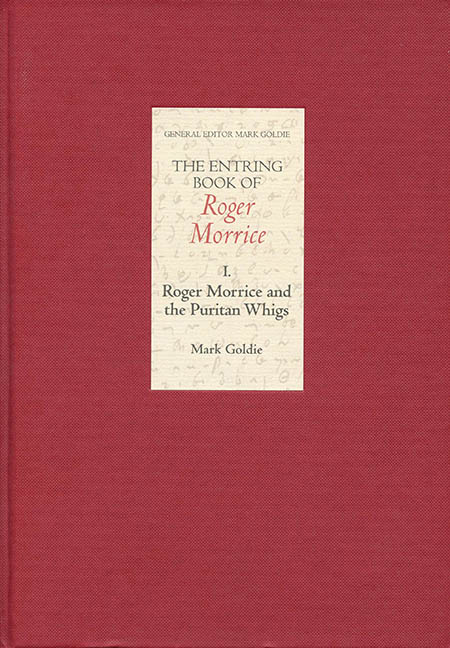Book contents
- Frontmatter
- Contents
- List of Illustrations
- Foreword
- Preface
- Notes on the Editors
- Acknowledgements
- Reader's Guide
- Abbreviations
- Genealogical Tables
- Maps
- Maps
- 1 Politics and Religion in the Era of the Entring Book
- 2 Roger Morrice: Fragments of a Life
- 3 The Text of the Entring Book
- 4 Puritan Whigs
- 5 Country Whigs
- 6 Middle-Way Religion
- 7 The History of the Puritans
- 8 Epilogue: The Entring Book and the Historians
- Appendices
- Bibliography
- Index
1 - Politics and Religion in the Era of the Entring Book
Published online by Cambridge University Press: 07 October 2017
- Frontmatter
- Contents
- List of Illustrations
- Foreword
- Preface
- Notes on the Editors
- Acknowledgements
- Reader's Guide
- Abbreviations
- Genealogical Tables
- Maps
- Maps
- 1 Politics and Religion in the Era of the Entring Book
- 2 Roger Morrice: Fragments of a Life
- 3 The Text of the Entring Book
- 4 Puritan Whigs
- 5 Country Whigs
- 6 Middle-Way Religion
- 7 The History of the Puritans
- 8 Epilogue: The Entring Book and the Historians
- Appendices
- Bibliography
- Index
Summary
Popery and arbitrary power
ROGER Morrice's Entring Book opens, without flourish or explanation, on 5 March 1677 and ends, abruptly and without a natural close, on 11 April 1691. It cannot, however, be a coincidence that these dates frame a decade during which the people of England feared that they would be overwhelmed by the forces of ‘popery and arbitrary power’. This was the second such crisis they had faced in less than half a century. The first had occurred during the reign of Charles I and extended from the rebellion of Calvinist Scotland in 1638 to the trial and execution of the king in January 1649. The second unfolded in the reigns of Charles's sons, Charles II and James II, and extended from the revelation of the Popish Plot in 1678 to the overthrow of the Catholic James in December 1688. Twice, therefore, a Stuart monarch was deposed. On the first occasion a republic was installed, which proved to be short-lived ; on the second, a parliamentary monarchy, which proved to be enduring. Whereas Oliver Cromwell's Protectorate collapsed within months of his death, William III's regime proved a foundation for the modern British state.
If the outcomes of these two crises were sharply different, so too were the courses they took. In the 1680s the English avoided another civil war, perhaps chiefly because they remembered too well the devastation of the previous one. Whereas Charles I was crushed by his enemies on the battlefield, Charles II triumphed over his through political guile and harsh repression, underwritten by a fund of popular loyalty, so that by the time of his death in 1685 the Stuart crown possessed unparalleled power. It was his brother's maladroitness and overt commitment to Catholicism that, within four years, squandered that achievement. Even then, it took the intervention of a foreign army to remove him, a Dutch invasion dignified by the name of the ‘Glorious Revolution’. Yet a revolution it was, because, before William of Orange's fleet arrived, the English were already engaged in a vast movement of civil disobedience against James, and because, after William's investiture, the great majority endorsed the settlement or acquiesced in it.
- Type
- Chapter
- Information
- The Entring Book of Roger MorriceRoger Morrice and the Puritan Whigs, pp. 1 - 32Publisher: Boydell & BrewerPrint publication year: 2007



